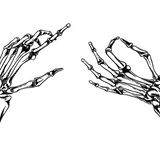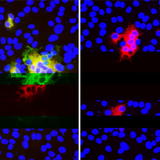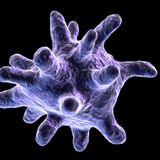RECENT ARTICLES

Questions Raised About How an Ancient Hominin Moved
ABOVE: According to a new study, the hands of the hominin Ardipithecus are much more like chimpanzee hands than human hands (illustrated here).he chimpanzee (Pan troglodytes) is the closest living relative of humans, with the two species diverging about 6 million years ago. One of the best clues about the last common ancestor of people and chimps is the oldest discovered hominin skeleton, that of a human ancestor named Ardipithecus ramidus that lived about 4.4 million years ago.In previous work, researchers deduced that Ardipithecus moved through the trees over the tops of...…ABOVE: According to a new study, the hands of the hominin Ardipithecus are much more like chimpanzee hands than human hands (illustrated here).he chimpanzee (Pan troglodytes) is the closest living relative of humans, with the two species diverging about 6 million years ago. One of the best clues about the last common ancestor of people and chimps is the oldest discovered hominin skeleton, that of a human ancestor named Ardipithecus ramidus that lived about 4.4 million years ago.In previous work, researchers deduced that Ardipithecus moved through the trees over the tops of...WW…

SARS-CoV-2 with Genomic Deletions Escapes an Antibody
hen SARS-CoV-2, the virus behind the COVID-19 pandemic, first emerged, scientists expected it to evolve slowly because the virus copies its big RNA genome with a polymerase that also corrects errors, thus minimizing the chance for certain types of mutations. This enzyme functionality isn’t present in other RNA viruses such as influenza and HIV, which accumulate single nucleotide polymorphisms, where one nucleotide is substituted for another, much more quickly than .This genomic stability was thought to be good news for vaccine design, but it’s become apparent in recent months, with the...…hen SARS-CoV-2, the virus behind the COVID-19 pandemic, first emerged, scientists expected it to evolve slowly because the virus copies its big RNA genome with a polymerase that also corrects errors, thus minimizing the chance for certain types of mutations. This enzyme functionality isn’t present in other RNA viruses such as influenza and HIV, which accumulate single nucleotide polymorphisms, where one nucleotide is substituted for another, much more quickly than .This genomic stability was thought to be good news for vaccine design, but it’s become apparent in recent months, with the...WW…

A Tweak to Immune Cells Reverses Aging in Mice
xcess inflammation is a problem in aging, contributing to issues such as atherosclerosis, cancer, and cognitive decline. But the mechanisms behind age-related inflammation are not well understood. In a study published today (January 20) in , researchers show that older immune cells have a defect in metabolism that when corrected in a mouse model of Alzheimer’s disease can decrease inflammation and restore cognitive function.After a decade of progress in understanding metabolism and nutrient usage in immune cells and how that affects their function, this study is a “beautiful example”...…xcess inflammation is a problem in aging, contributing to issues such as atherosclerosis, cancer, and cognitive decline. But the mechanisms behind age-related inflammation are not well understood. In a study published today (January 20) in , researchers show that older immune cells have a defect in metabolism that when corrected in a mouse model of Alzheimer’s disease can decrease inflammation and restore cognitive function.After a decade of progress in understanding metabolism and nutrient usage in immune cells and how that affects their function, this study is a “beautiful example”...WW…
- Total 3 items
- 1